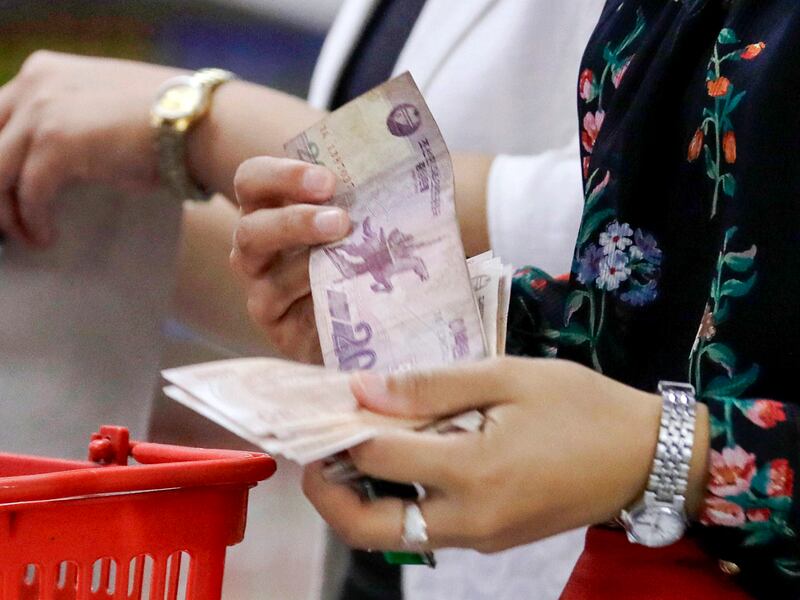Read the two Korean stories that this article sourced.
Hyperinflation and rumors of currency reform in North Korea are prompting wealthier people to buy up expensive goods that hold value such as electronics and auto parts, residents in the country told Radio Free Asia.
Poorer people, meanwhile, are struggling with their devalued currency as the price of food and firewood, needed to heat their homes this winter, has soared to unaffordable levels.
The price of key commodities has soared. Rice, considered a luxury, now costs more than 10,000 won (33 U.S. cents) per kilogram (2.2 pounds) in the eastern province of South Hamgyong, about one-third of the average monthly salary from a government-assigned job. Rice is even more expensive in other parts of the country.
Meanwhile, the Chinese yuan and the U.S. dollar have more or less quintupled against the won over the past year, sources said. That’s important because most staples in North Korea have been imported from China and merchants prefer to trade in terms of foreign currencies.
Prices can fluctuate due to various factors, but food is supposed to be cheaper at this time of year, with the fall harvest recently completed.
With the value of their money rapidly decreasing, people are trying to use it to buy things that hold value, a resident of South Hamgyong told RFA Korean on condition of anonymity for security reasons.
“These days, people who have money are buying products in bulk,” he said. “This is because the exchange rate continues to rise along with the product prices. There is even talk of currency reform.”
Past scars
The people still have a sour taste left in their mouths from the last time the country reformed its currency in 2009, making bills issued prior to the reform obsolete, and limiting the amount of “old” won that each person could exchange for “new” won. Personal savings were devastated and small fortunes erased.

“We don’t know if it is real, but the overall atmosphere is chaotic as rumors of currency reform spread,” he said. “Not everyone is that concerned about the rise in rice prices, exchange rates, and currency reform, but people with money are especially on full alert.”
The resident said that those with money are also trying to buy things that they can sell again later once prices stabilize or after a potential reform.
RELATED STORIES
Chilly North Koreans Grumble as Authorities Ban Firewood Trade Ahead of Winter
North Korea boosts salaries, introduces cash cards for more currency control
Apology Issued for Currency Gaffe
“A friend who made a lot of money selling sea cucumbers goes around collecting goods such as used color LCD TVs and computers,” he said. “He is spending all the money he has, leaving only enough money to buy food.”
Another friend is buying up car parts, he said. Merchants who usually make a living selling things in the marketplace are now staying home to hold onto their wares.

Merchants in the northeastern province of North Hamgyong are also staying away from the markets out of precaution, a resident there told RFA on condition of anonymity for personal safety.
“The authorities are placating residents by saying that currency reform is just a rumor,” he said, adding that they learned to hold on to products in 2009, because after that reform it was the people who had a lot of goods that made a fortune off of it.
He said the merchants are going after food products that can be held long-term like soybean oil and sugar. Other products they are shelling out for include lumber, paint, automotive parts and tires.
“Even if currency reform is just a rumor, merchants believe that it is more profitable not to sell products right now, as the dollar exchange rate continues to rise in line with the prices of products,” he said.
Pervasive anxieties
He said that the sharp rise in prices is upsetting for both rich and poor, but for different reasons.
“People with money worry about losing all their money, and ordinary people without money worry about how high the prices will rise and they spend their days filled with anxiety.
A resident in the northern province of Ryanggang told RFA that exchange rates are rising even faster than they did in 2009.
“The consequences of raising workers’ salaries by more than ten times earlier this year are only now beginning to show,” he said, alluding to the higher prices.
Large increases in salaries for everyone’s government-assigned jobs started in December 2023, with workers in certain industries getting 40 times what they had previously. Most workers saw an 10- to 15-fold increase, however.
While it did provide a boost in income, salaries are still not enough to live on, and most families still have to run side businesses, often by trading goods in the marketplaces.
The Ryanggang resident, who believes the inflationary effects of these increases are being felt now, said that the dollar went from 28,000 won on Dec. 1 to 41,000 on Dec. 8.
Rice rose to 12,000 won per kilogram. Potato prices, meanwhile, have more than tripled.
Most people are having trouble with food prices, but even if they have enough money to cover the rapid increases, they don’t have enough left over for charcoal and firewood, which is necessary to keep homes warm in the harsh Siberian winters, he said.
“The merchants don’t even answer when asked about the price of firewood in won,” the Ryanggang resident said. If one is paying in dollars or yuan, though, the price is similar to what it was in those currencies a year ago.
“The value of our money has sharply decreased.”
To make due without charcoal or firewood, poorer people are resorting to making “fake briquettes,” he said. They crush corn straw, bean pods, or sawdust, and mix it with mud, and then stamp it out into the same shape as a briquette.
“They are barely enough to cook a meal, but not enough for heating rooms.”
With their monthly salaries they can only afford to buy six of these fake briquettes.
Firewood and charcoal are more difficult to find than food these days, a university student in the same province said. Temperatures in the province are at minus 7 degrees Celsius (19.4 degrees Fahrenheit), but go as low as minus 17 degrees Celsius (1.4 degrees F) at night.
“If the firewood problem is not solved immediately, many people will freeze to death this winter,” he said.
The provincial government is aware of the issue and has supplied 50 kilograms (110 pounds) of lignite coal to families of disabled soldiers, the student said.
“But 50 kilograms of lignite would not last even 10 days in winter, and families who do not have a disabled soldier didn’t even get that.”
Translated by Claire S. Lee and Leejin J. Chung. Edited by Eugene Whong and Malcolm Foster.
